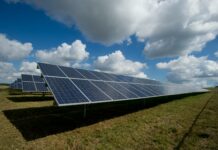
In addition to governmental and societal pressure, the American gas industry faces scrutiny from its investors and customers who demand proof that its fuel contains a lower carbon capability making it marketable across the globe. Answering the call to action, top U.S. gas producer EQT Corporation and top exporter Cheniere Energy Inc. joined forces to document and track emissions from wells that primarily supply shipping terminals.
With methane identified as a possible greenhouse gas that is increasingly criticized for its contribution to climate change, the proactive partnership is attempting to gather reliable data on methane release and project how it can reduce its emission over time.
“What we’re trying to really do is build the trust up to the end-user that our measurements are correct,” said EQT’s Chief Financial Officer, David Khani. “Let’s put our money where our mouth is.”
The past decades have brought a boom in the natural gas industry as countries positioned themselves to replace dirtier fuel sources like coal and oil. Although it has often been touted as the bridge to a low-carbon future and gas operations burn cleaner than the alternate coal, gas operations can leak methane. This has a greater negative impact on global warming as opposed to carbon dioxide emissions, yet it makes up a smaller percentage of the total emissions of greenhouse gas.
Because of the growing concerns of methane emissions, investors, policymakers, and liquified natural gas (LNG) buyers are reconsidering the fuel’s part in their energy makeup. These concerns were magnified earlier in the week when a United Nations scientific panel highlighted methane’s contribution to climate change.
These identified concerns pose a problem for shippers of LNG due to the fact that a portion of their customers plan to reduce gas consumption in the coming time. Japanese regulators indicated that its power generation by 2030 would consist of 20% LNG. The European Union has been modeling ideas to pressure LNG shippers to reduce emissions. They have considered branding LNG as one of the imports that would be subjected to a recently proposed carbon border tax.
With investors within the oil and gas industry striving to focus on ESG (environmental, social, and governance) issues, companies face mounting pressure to reduce their carbon footprint. It has become increasingly acute for oil and gas companies as their products have a direct effect on climate change.
While countries across the globe heavily consume natural gas as economies attempt to emerge from the COVID-19 pandemic, shale executives recognize the need to keep domestic supplies competitive over the long term through requiring companies to contain leaking wells, process facilities, pipelines, and export plants prior to tankers transporting it globally. They indicated the challenge resides in proving to the opposition that they are being proactive and trying to complete the control tasks.
Over a period of six months, Cheniere and EQT, joined by Pioneer Natural Resources and three other domestic producers, plan to test drones, cameras equipped to see methane gas, and additional technologies across approximately 100 wells in the Marcellus and Haynesville Shales, as well as the Permian Basin.
The group plans to collect the methane emissions data and compare it to current estimates published by U.S. environmental regulators. Critics consider this current data to be overly conservative as it is not based upon continuous measurements. After the information is collected, the companies will then determine which technology is most dependent and effective when released on a larger scale for continuous monitoring of methane links. Consideration will also be directed toward applications that are most efficient in cutting the emissions.
EQT has pledged $20 million in expenditures over the next couple of years to replace defective pneumatic devices that result in leaks with electric-drive valves. These devices assist in transporting fluids from wells to water tanks and production facilities. As of last year, EQT began using electric-powered hydraulic fracturing equipment.
This past April brought Cheniere’s first carbon-neutral cargo to Royal Dutch Shell PLC in Europe by buying carbon offsets from Shell. The company will be able to provide emissions data next year on those tied to each shipment it transfers from its two Gulf Coast facilities of export. The data will be derived from its analysis of supply chain emissions.
According to Anatol Feygin, Cheniere’s Chief Commercial Officer, the company expects its analysis to reveal an emissions range from gas producers, pipelines, and exporters. They, however, suspect that emissions from the gas it gathers will be low.
Feygin voiced the opinion that the domestic gas industry has not “done a good job of getting the transparent, audible information,” and it needs to support its claim that it has been reducing emissions. Cheniere has not announced any partnerships with pipeline companies but has indicated it is an area that needs greater attention.
Nick Vaccaro is a freelance writer and photographer. Besides providing technical writing services, he is an HSE consultant in the oil and gas industry with eight years of experience. He also contributes to Louisiana Sportsman Magazine and follows and photographs American Kennel Club field and herding trials. Nick has a BA in Photojournalism from Loyola University and resides in the New Orleans area. 210-240-7188 [email protected]














